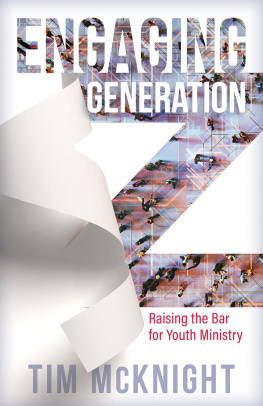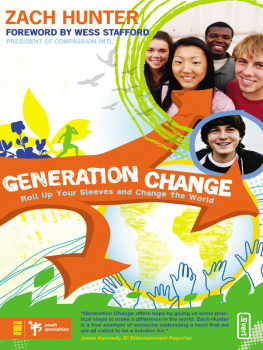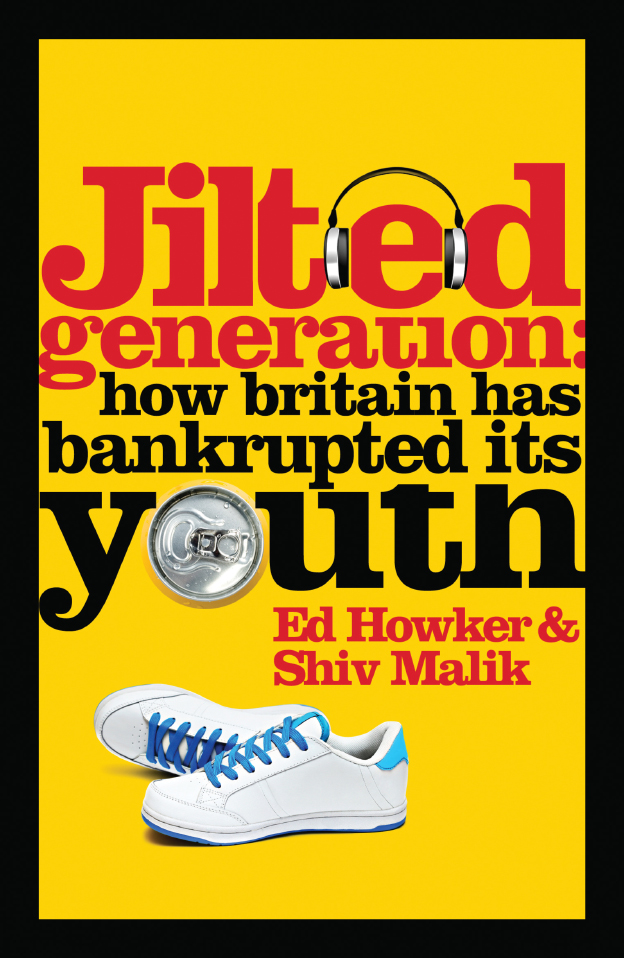Jilted Generation
How Britain Has Bankrupted its Youth
Ed Howker and Shiv Malik

Published in the UK in 2010 by
Icon Books Ltd, Omnibus Business Centre,
3941 North Road, London N7 9DP
email:
www.iconbooks.co.uk
This electronic edition published in 2010 by Icon Books
ISBN: 978-1-84831-236-4 (ePub format)
ISBN: 978-1-84831-237-1 (Adobe ebook format)
Printed edition (ISBN: 978-1-84831-198-5)
sold in the UK, Europe, South Africa and Asia
by Faber & Faber Ltd, Bloomsbury House,
7477 Great Russell Street, London WC1B 3DA
or their agents
Printed edition distributed in the UK, Europe, South Africa and Asia
by TBS Ltd, TBS Distribution Centre, Colchester Road,
Frating Green, Colchester CO7 7DW
Printed edition published in Australia in 2010
by Allen & Unwin Pty Ltd,
PO Box 8500, 83 Alexander Street,
Crows Nest, NSW 2065
Printed edition distributed in Canada by
Penguin Books Canada,
90 Eglinton Avenue East, Suite 700,
Toronto, Ontario M4P 2YE
Printed edition published in the USA in 2010 by Totem Books
Inquiries to: Icon Books Ltd, Omnibus Business Centre,
3941 North Road, London N7 9DP, UK
Distributed to the trade in the USA
by Consortium Book Sales and Distribution,
The Keg House, 34 Thirteenth Avenue NE, Suite 101,
Minneapolis, Minnesota 55413-1007
Text copyright 2010 Ed Howker and Shiv Malik
The authors have asserted their moral rights.
No part of this book may be reproduced in any form, or by any means, without prior permission in writing from the publisher.
Typeset in Plantin Light by Marie Doherty
CONTENTS
Chapter 1:
Chapter 2:
Chapter 3:
Chapter 4:
About the authors
Ed Howker is a journalist at The Spectator magazine and before that worked on current affairs documentaries for Channel 4s Dispatches programme. Shiv Malik writes for the Sunday Times and Prospect magazine and is a regular broadcaster. They are both 29 and live in London.
To our parents, thank you.
INTRODUCTION
Like all demographic change, the decline in childbirth carries both plusses and minuses. The crime rate ought to fall, since the 1619 age-group includes the highest number of offenders; but that may be offset by a falling off in young recruits for the police. The young will suddenly find themselves much more sought-after. Universities and other places of higher education may be forced to lower their standards of entry. Employers will have to compete for them: the blight of youth unemployment should start to lift. Their wages, which in recent years have been falling behind, may accordingly burgeon.
When the springs of youth run dry, leading article, The Guardian , 6 April 1988
Perhaps this is a book about coincidence, an unconnected series of unfortunate events. Human nature is such that we seek out simple shapes and narratives for our lives where there are none; we try to impose order on happenstance and accident. We look for heroes and villains. Stories comfort us. They give us someone to blame.
If nothing else, you could say that coincidence is painted thick onto the lives of those born in September 1979 and afterwards. Theirs would be the first generation to receive student loans and be compelled to pay tuition fees while their contemporaries, born just weeks earlier, and who therefore entered school a full year beforehand, would pay nothing. That they would start their university careers in the very year when property prices began their skyrocketing trajectory far beyond the future incomes of Britains young workers seems unlucky. And that they will spend the next 30 years of their working lives paying off implicit government debt, and the very explicit deficit, seems somehow ill-fated too. And this, of course, assumes that they get a job, since many of them are joining the employment market following the worst recession in decades.
But what if these observations, many of which seem to be the concerns of the best-educated and richest young people, barely scratch the surface of the peculiar predicament in which an entire generation now find themselves? What if their disparate problems are linked and are getting worse? And what if the forces that shape their lives and their hardships real or imagined have been gathering pace and power for several decades so subtly that they are almost imperceptible today? Sometimes the only retort that seems to make sense is the one their parents offer: stop whingeing, stop complaining, just get on with it.
These, more or less, are the questions that have shaped this book, but to answer them fully is an almost impossible task. The post-79 generation have already lived through an era of momentous change. A Cold War between Britain, its allies, and communism melted away before the oldest of them were teenagers, only to be replaced by unpredictable but frequent real wars in the Middle East and Asia. By the time that generation took GCSEs, the internet was beginning to change for ever the terms and opportunities for communication. And over the course of their lives digital innovations have led a rapid evolution in the means of manufacturing, service provision, and the nature and frequency of human interaction. Further, a political and scientific movement embryonic at their birth had pushed environmental concerns to the forefront of peoples lives by the time they reached adulthood. Its all but impossible to measure the effect of so many complex forces on an entire generations lives. So, were just a page into this book and already were forced to admit that its not going to tell the whole story. For example, in the following pages we dont examine environmental issues in any detail. We dont trace the cause of feminism and try to quantify its effect on the freedoms and opportunities of women; we dont examine fully the impact of technology on the lives of young people, or even what numerous irregular and often contradictory education reforms have meant for them. Others have explored these trends better than we ever could. We dont even have a particular qualification for investigating this subject, apart from the fact that were members of that post-79 generation.
So what are we looking at? This book examines four basic areas that form the foundation of peoples lives regardless of which generation theyre born into: Housing, Jobs, Inheritance how wealth is transferred between generations and Politics. Theres another good reason for confining the terms of this book to these areas. These four subjects are easier to compare between generations, and were going to need to do that if were to establish whether Britains young adults really are having an unexpectedly rough time. After that, weve tried to piece together what has happened and what can be done to fix it.
As you might have guessed from the title, we dont think our generation have been treated very well. We think theyve been jilted cast aside. What we tell in this book is a tale of neglect not by our parents generation (if anything, theyve often been left to pick up the pieces), but by British society more generally. Perhaps that sounds strange. Believe us when we tell you that the story is about to get a whole lot stranger. But before we dive deep into the weirdness wed better explain exactly who the jilted generation are.
Meet the jilted generation
The most recent measure of Britains population comes from 2008. Figure 1 shows us the shape of those generations alive today.








